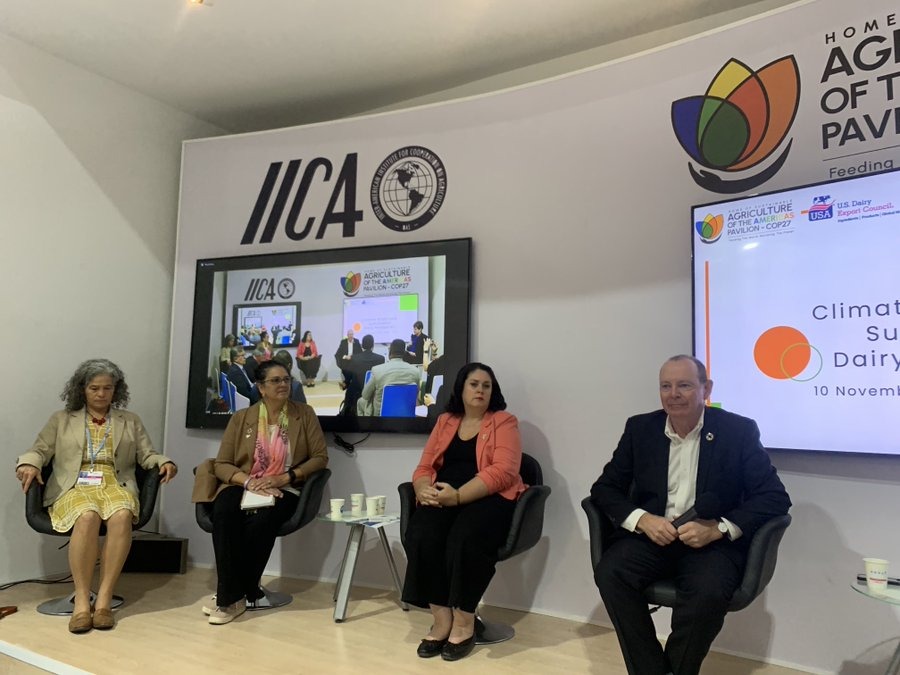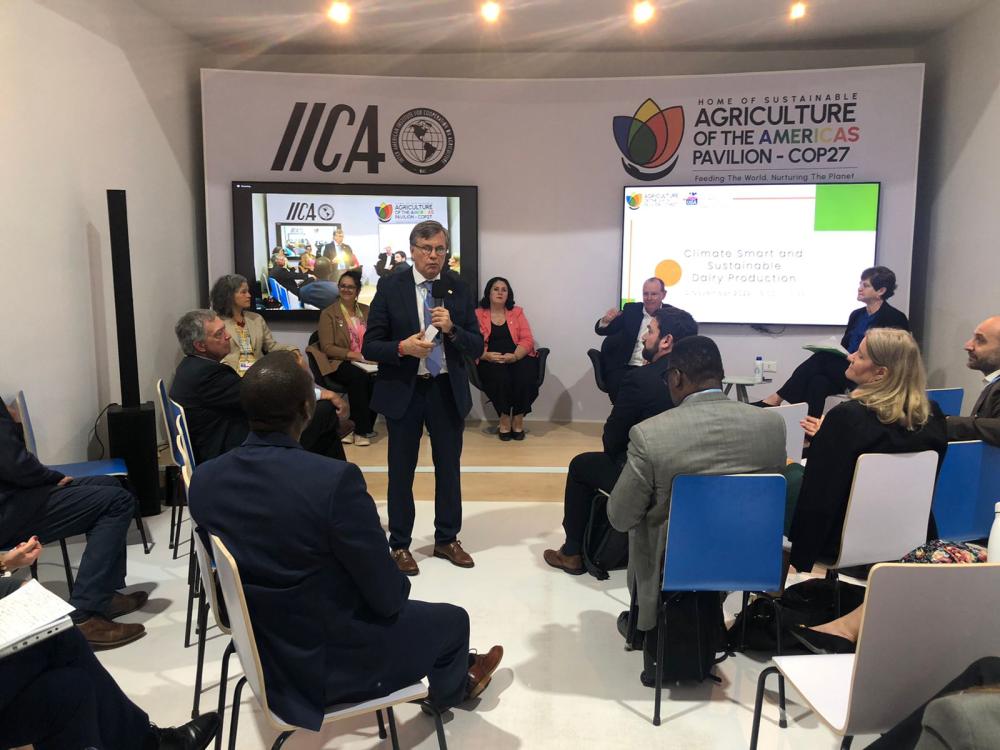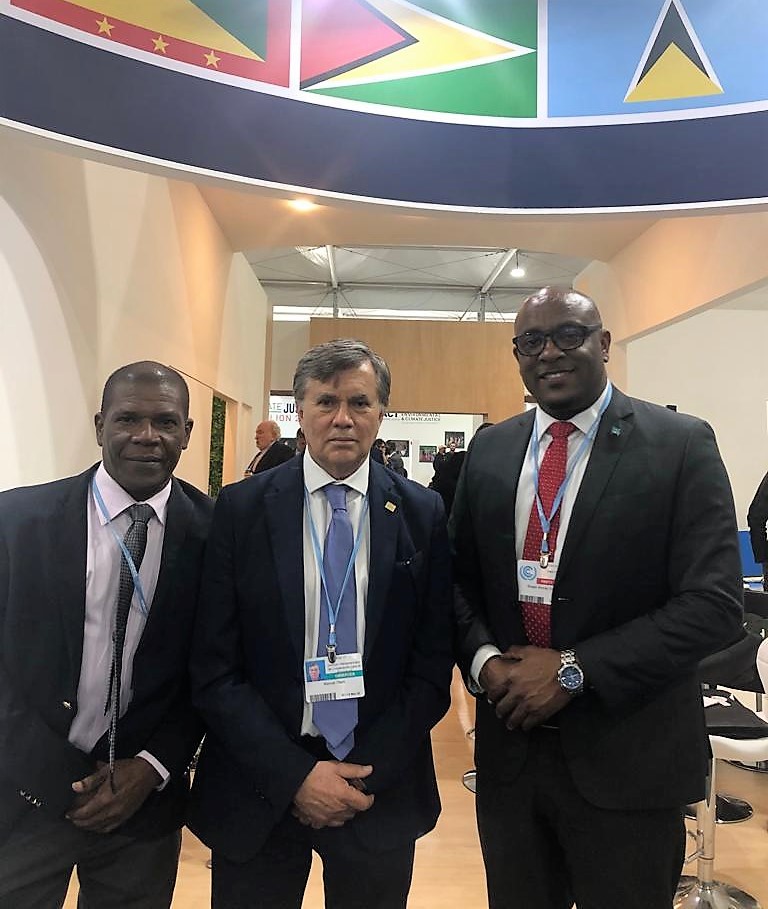The panel discussion “Livestock Sustainability throughout the World. Working towards Sustainability in All Regions and for All Production Systems” was an event at the COP27. The venue was the Home of Sustainable Agriculture of the Americas, a pavilion mounted at the summit by the IICA, with the support of its Member States and international partners.

Sharm El-Sheikh, Egypt, 10 November 2022 (IICA) – The livestock industry is moving at full tilt towards sustainability in the Americas and other continents and continues to play a central and invaluable role in global food security. This was demonstrated by concrete examples shared by public and private sector representatives participating in a panel discussion at COP27, which is taking place in the Egyptian city of Sharm El-Sheikh.
The panel discussion “Livestock Sustainability throughout the World. Working towards Sustainability in All Regions and for All Production Systems” was an event at the 27th Conference of the Parties to the United Nations Framework Convention on Climate Change (COP27). The venue was the Home of Sustainable Agriculture of the Americas, a pavilion mounted at the summit by the Inter-American Institute for Cooperation on Agriculture (IICA), with the support of its Member States and international partners.
The discussion was organized by The Protein Pact, an initiative representing livestock farmers and companies that produce beef, pork, poultry and dairy products in the United States, with a common vision to strengthen the contribution of animal protein to food security and environmental conservation. The panelists included William Hohenstein, Director of the Office of Energy and Environmental Policy at the United States Department of Agriculture (USDA); Gianni Motta, representing Uruguay’s National Meat Institute (INAC); Laura Cramer, of the International Livestock Research Institute (ILRI); and Max Makuvise, a farmer who uses cutting edge technology in his livestock operation in Africa.
IICA Director General, Manuel Otero, offered the opening remarks at the event, which was also attended by Fernando Mattos, Minister of Livestock, Agriculture and Fisheries of Uruguay, who indicated that, “Uruguayan livestock production has always sought to protect natural resources long before climate discussions began at the global level”.

The presentations were preceded by an educational video that outlined the progress that the United States’ meat and dairy industries had made in reducing greenhouse gas emissions, increasing the resilience of producers, protecting jobs and contributing to safeguarding biodiversity and animal welfare.
Hohenstein, who is responsible for climate change related policies in U.S. agricultural production, gave a detailed presentation on mitigation and adaptation actions, including the significant incorporation of new technologies, innovation and research.
“We have resources at our disposal, thanks to the fact that this year the United States approved the Inflation Reduction Act that has implemented the most important climate change agenda that we have ever had in this country. We are reaching all livestock farmers in the country, with more than 70 projects, valuing 3 billion dollars across all the states. This includes beef, pork, poultry and dairy producers”, said Hohenstein.
The official explained that the initiatives seek to assist producers, who have been heavily impacted by climate change, in achieving resilience through various actions, including the application of good practices in the management of animals, water, land and other natural resources. “There is still a great deal of work to be done”, warned Hohenstein.
Uruguay’s significant achievements
Gianni Motta provided an extensive and detailed account of Uruguay’s substantial progress in recent years in improving the environmental sustainability of its livestock production.
“Our country is the size of an average European country. Although we are a small country by South American standards, we are not by global standards. Our small population is primarily concentrated in the Atlantic region. We have the highest Gross Domestic Product per capita in all of South America”, he noted.
Motta explained that agriculture has great economic importance in Uruguay, accounting for 75% of national exports.

“We produce food for 40 million people. Agriculture employs one out of every six workers in the country. This is because we possess five hectares per person and an abundance of water resources. Our entire territory is home to the pampas ecosystem, comprised of natural grasslands that we share with Argentina and Paraguay. These grasslands provide superb conditions for food production”, he remarked.
The specialist also indicated that 43% of Uruguay’s forests have been protected by law since 1987, making Uruguay the only country in South America to have increased its forest area.

Motta illustrated the ways in which Uruguayan livestock farming has boosted productive and environmental efficiency, succeeding in reducing methane emissions by 30% and increasing meat production—84% of which is carried out on natural grasslands—by 90%.
He also described a joint public and private sector initiative to measure greenhouse gas emissions and natural resource use in livestock production.
In turn, Laura Cramer, who works in African countries such as Kenya and Ethiopia, explained that livestock farming in Africa is not only vital for food security, but also for social sustainability and combating climate change.
“The narrative surrounding livestock farming and climate change is overwhelmingly negative; we must amend this misrepresentation. Sustaining livestock farming is crucial for food security and the income of millions of people”, she said.
In the same vein, Makuvise warned that livestock farming in Africa is not only important for meat production, but also for the provision of many other resources. “Sharing knowledge and experiences is key”, he said “as this is the only way to develop the best solutions”.
More information:
Institutional Communication Division.
comunicacion.institucional@iica.int










